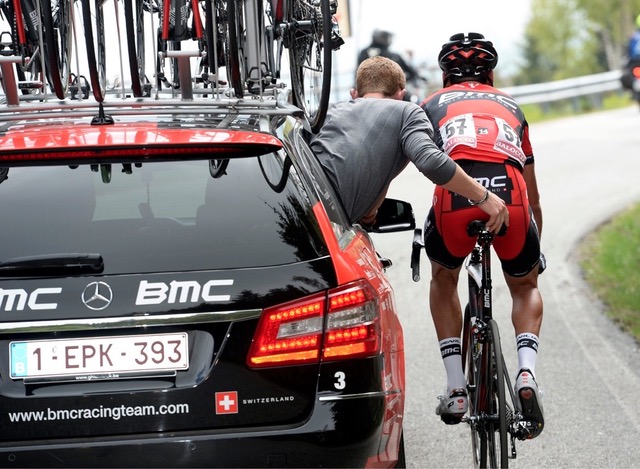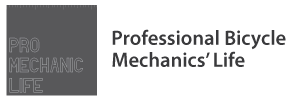
Aaron Fairley is a mechanic for the Trek-Segafredo UCI WorldTeam. Having attended the Bill Woodul Race Mechanics Clinic in 2010, Aaron went to Europe soon after, working with a number of USA Cycling Athletes programs. Following his time at USA Cycling, Aaron went on to work with BMC Racing Team for six years. Over the years he has worked all major races including the three Grand Tours, the monuments, Olympics, and numerous World Championships supporting athletes such as Cadel Evans, Greg Van Avermaet, Philip Gilbert, Tejay van Garderen, Mads Pedersen, and Richie Porte. Now, in his second year with Trek-Segafredo, Aaron lives full time in Amsterdam and is a well respected mechanic on the World Tour scene all over the world.
We Americans are few and far between here and since there isn’t a lot of racing happening I’d be glad to share some of my knowledge. Personally I can only describe what I have learned/discovered over the years working with pro-men road teams.
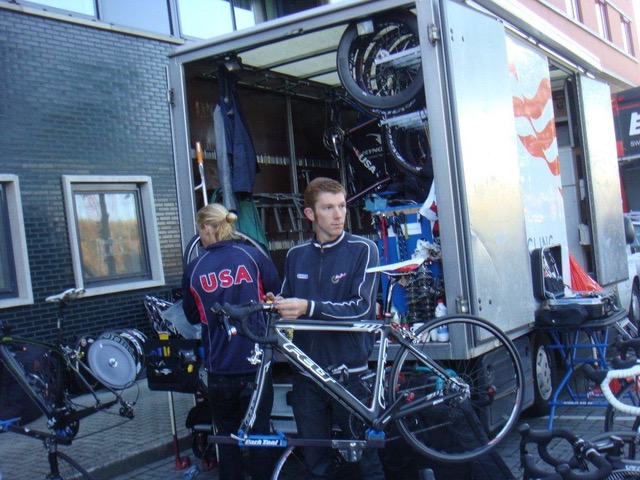
The topics below are relevant for anyone looking to work outside of the United States. There are many pathways to achieving one’s goal: the ideas below are generalized hot topics that most will find somewhere between interesting and an eternal challenge!
Visa: Very important, probably the most important in fact. Basic Schengen (26 EU countries with essentially borderless travel) visa for US travelers to Europe is 3-months. Although it is categorized as a tourist visa, almost all US mechanics coming to Europe on a temporary basis use it when working events here (very much a grey area and country-dependent on enforcement). I have done this and I am sure James Stanfill has as well. It is limiting because you are only allowed to stay in the Schengen for 90 days out of 180 days rolling. If you plan on staying for longer, it becomes more complicated. Some are very lucky in that either they themselves qualify for dual-residency through family lineage (I know someone who has done it through the UK and one through Portugal) or married into dual-residency (two cases in Spain). Those less fortunate, myself included, need to find another route. When applying for a long-stay visa many countries require that you are not ‘taking’ a job from someone already living in said-country – Belgium for example. Other countries such as France, Spain, and Italy have special sporting visas. I am not sure of the exact details or if it would apply to sport support personnel (the only people I know with these visas are riders). I myself have a visa in the Netherlands which allows me to be a resident on a self-employed basis, it is known as the Dutch-American Friendship Treaty (DAFT).
Truck license: Second major point. Technically speaking, if you have a truck license in the US and an IDP your can drive a truck anywhere in the world. An additional requirement for driving in Europe though is a digital tachograph card (for all trucks built from 2004 and on). The catch is you need a European license to acquire one, and for a European license you will need legal status. All teams look for mechanics with a truck license. However, I would not go as far as saying that if you are unable to drive the truck here you are not a valuable asset in a team. We are fortunate that the technology of cycling has developed so much. I am of the opinion that being able to do firmware updates and consistent/accurate bike measurements, for example, are equally important to driving the truck, washing cars, and gluing tubs. There are many ways to be valuable to a team organization: everyone has their own strengths. Nonetheless I am in the middle of working on my Dutch licenses (everything needs to be redone from zero, in Dutch, exams/lessons/etc, including car).
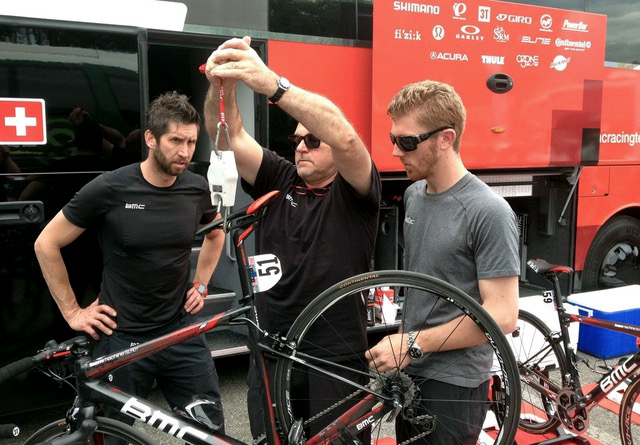
‘Coming up’/Who teams hire: From a hiring standpoint, teams ideally look for mechanics who are both qualified and logistically feasible to hire. Someone may be the best mechanic in the world but because of a logistics problem a team may not consider the hire. This is where someone’s personal friend/family is a factor; for example any one person working for a team in Belgium has a long list of contacts (living close by) who could ‘qualify’ for the job. This is very much an old system, one of convenience, that does not necessarily promote the bicycle mechanic profession. What James is doing with the PBMA could be a very good thing here just like in the US, especially to break out of this ‘old-school’ mentality adopted by many teams.
Cold calling: It is always good to put your name out there and solicit teams! You never know who you might hear back from. I remember several years ago I reached out to a handful of teams and if I remember well I had replies from about 75% of them. Some may be actively looking for new mechanics but the others, even though they may be fully staffed, will keep your CV/contact info on file for future reference. Keep the contact up and stay fresh in the managements’ minds. Additionally, keep going to races and working hard, people will notice!
5 Americans ‘made it work’: Off the top of my head I can think of four active American mechanics on WorldTour teams living full-time in Europe. I suppose I am included. There is one more I know of who is still living out here but he has been inactive in teams for the last fifteen years or so. He was more or less the first to come over and make it work with 7-11/Motorola. Others have worked for teams but over the years have either retired or moved back to the US.
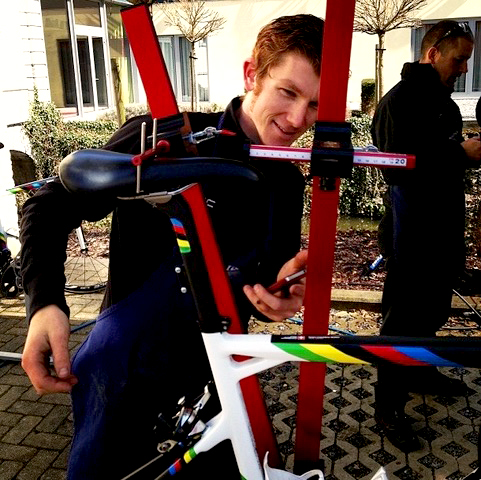
USAC: USA Cycling has provided many opportunities to many people over the years. It is where I started off in Europe thanks to James Stanfill. USAC staff nowadays is primarily European (at least for the road and track calendar). I know from conversations I have had with their European program manager he would like to have more American staff but logistically it is difficult. Pay is not at the high end of the range by any means, however there is fair remuneration and the experience gained is invaluable.
The ‘mafia’: Every country has what one could consider a ‘mafia’ – a core group of people who have worked in this business for decades and know all the contacts and the ins-and-outs. This may seem daunting starting out but the longer you work the races the more veterans you become acquainted with. Definitely helps to learn a bit of Flemish, French, Italian, etc… After that many possibilities open up.
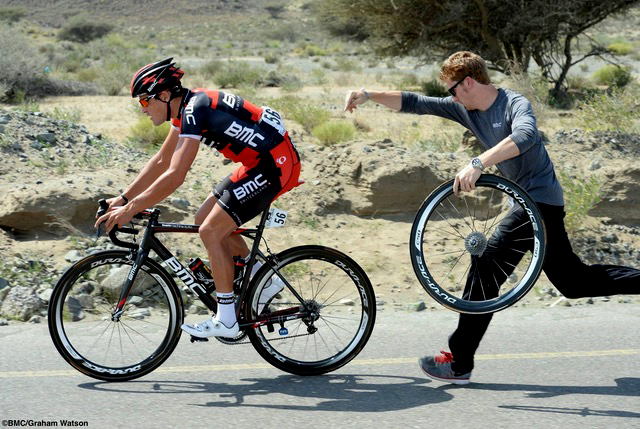
Neutral service: People often ask if working with a neutral service team is a good starting point for pro-cycling in Europe. From all that I have seen it is even more difficult to work for a neutral service team at races in Europe than with trade teams. Mavic neutral have had a core group of the same all-French staff for years, Shimano neutral has all Dutch and Belgian guys, and Vittoria neutral has their core group of Italians. Many of the support staff I know working for these organizations come from a team background. They still want to go to the races but with fewer days on the road compared to if they were with a trade team.
Coming to Europe and working the road circuit is by no means an easy journey. There are many sacrifices you’ll need to make as a mechanic make it work, however if you are committed you can make it work.
